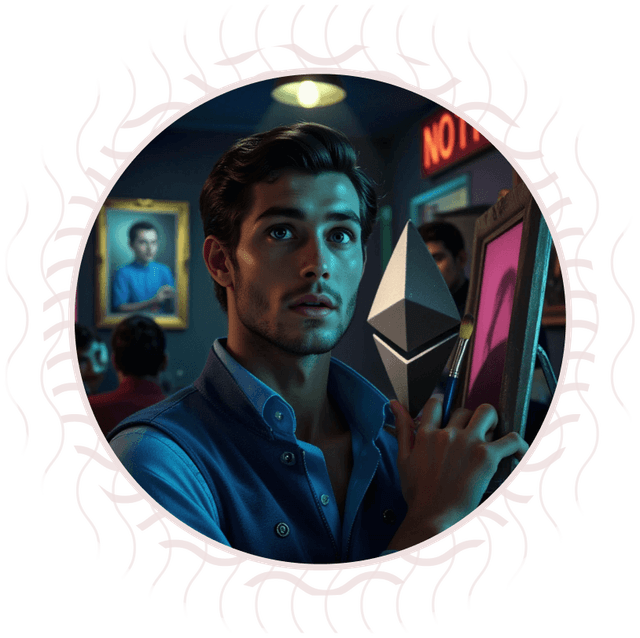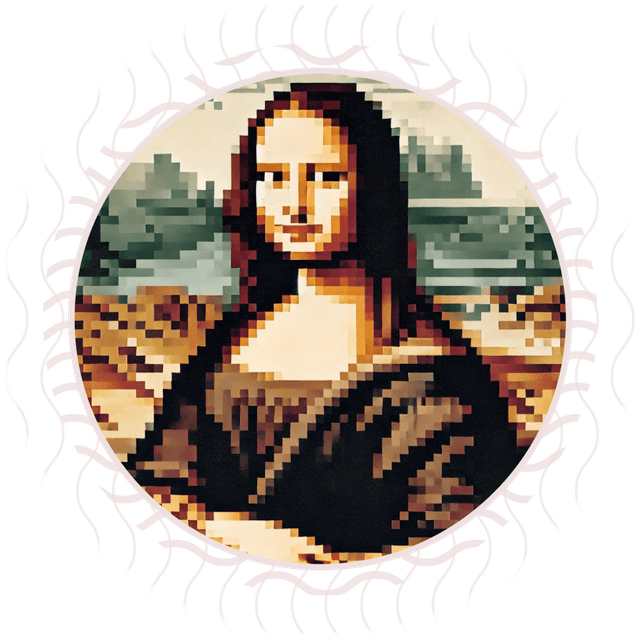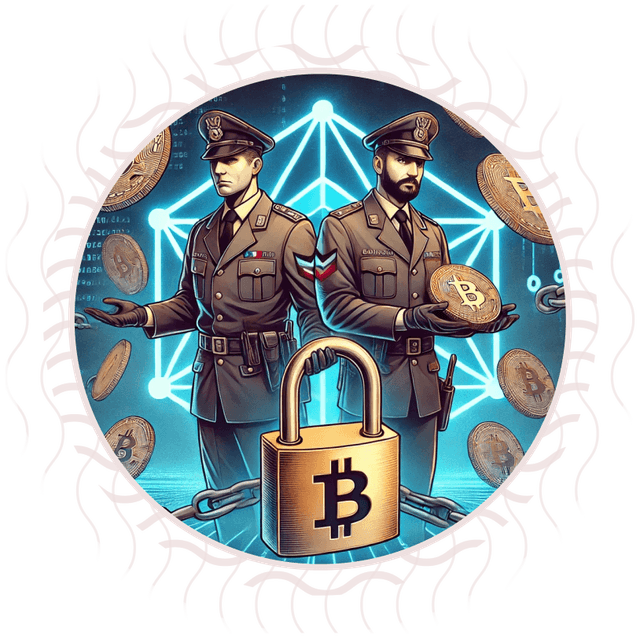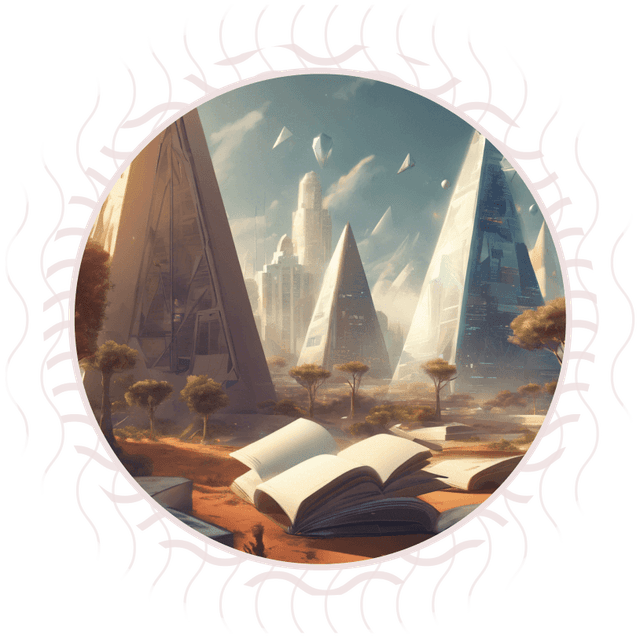



Come artista, è possibile utilizzare gli NFT (Non-Fungible Tokens) per proteggere e monetizzare i diritti d'autore sulle opere realizzate e inedite, o edite di cui si dispongono pienamente i diritti.

Gli NFT (Non-Fungible Tokens) sono risorse digitali uniche registrate su una blockchain.

Un avvocato che desidera proteggere i diritti d'autore dei propri clienti, può utilizzare gli NFT (Non-Fungible Tokens).

Come artista, è possibile utilizzare gli NFT (Non-Fungible Tokens) per proteggere e monetizzare i diritti d'autore sulle opere realizzate e inedite, o edite di cui si dispongono pienamente i diritti.

Gli NFT (Non-Fungible Tokens) sono risorse digitali uniche registrate su una blockchain.

Un avvocato che desidera proteggere i diritti d'autore dei propri clienti, può utilizzare gli NFT (Non-Fungible Tokens).

Come artista, è possibile utilizzare gli NFT (Non-Fungible Tokens) per proteggere e monetizzare i diritti d'autore sulle opere realizzate e inedite, o edite di cui si dispongono pienamente i diritti.

Gli NFT (Non-Fungible Tokens) sono risorse digitali uniche registrate su una blockchain.

Un avvocato che desidera proteggere i diritti d'autore dei propri clienti, può utilizzare gli NFT (Non-Fungible Tokens).

Perché gli NFT possono cambiare il tuo modo di tutelare i tuoi diritti
Le consuetudini e le norme di una società analogica, ci hanno fin d’ora portato a considerare attendibile solo ciò che un’autorità, nelle sue espressioni, dichiarava tale. Ciò scalando, in tutti i contesti di una società: da quelle più grandi a quelle minori, dal pubblico al privato, ovunque sia in modo gerarchico e centralizzato, la bontà di un atto e la sua veridicità sono sottoposti al parere di pochi, o di un singolo. Anche l’informatica ha riflettuto questo approccio, diventando essa stessa un supporto alle strutture centralizzate. Per di più, nella stessa informatica si sono consolidati attori primari, di enormi dimensioni, che rispecchiano l’impostazione fino ad ora descritta.

Perché gli NFT possono cambiare il tuo modo di tutelare i tuoi diritti
Le consuetudini e le norme di una società analogica, ci hanno fin d’ora portato a considerare attendibile solo ciò che un’autorità, nelle sue espressioni, dichiarava tale. Ciò scalando, in tutti i contesti di una società: da quelle più grandi a quelle minori, dal pubblico al privato, ovunque sia in modo gerarchico e centralizzato, la bontà di un atto e la sua veridicità sono sottoposti al parere di pochi, o di un singolo. Anche l’informatica ha riflettuto questo approccio, diventando essa stessa un supporto alle strutture centralizzate. Per di più, nella stessa informatica si sono consolidati attori primari, di enormi dimensioni, che rispecchiano l’impostazione fino ad ora descritta.

Perché gli NFT possono cambiare il tuo modo di tutelare i tuoi diritti
Le consuetudini e le norme di una società analogica, ci hanno fin d’ora portato a considerare attendibile solo ciò che un’autorità, nelle sue espressioni, dichiarava tale. Ciò scalando, in tutti i contesti di una società: da quelle più grandi a quelle minori, dal pubblico al privato, ovunque sia in modo gerarchico e centralizzato, la bontà di un atto e la sua veridicità sono sottoposti al parere di pochi, o di un singolo. Anche l’informatica ha riflettuto questo approccio, diventando essa stessa un supporto alle strutture centralizzate. Per di più, nella stessa informatica si sono consolidati attori primari, di enormi dimensioni, che rispecchiano l’impostazione fino ad ora descritta.

La blockchain è una tecnologia di registro distribuito che consente la memorizzazione sicura e trasparente delle transazioni.

La blockchain è una tecnologia che consente di registrare transazioni in modo sicuro e trasparente. Trattandosi di una tecnologia, della quale ampia e complessa la molteplicità di opzioni e soluzioni, può sembrare un ostacolo per gli utilizzatori e quindi frenare il rateo della sua adozione. Tuttavia sono già molte le applicazioni che si posizionano sulla blockchain e che in essa erogano servizi agli utenti finali.

Ethereum è ampiamente riconosciuta come una delle migliori piattaforme per lo sviluppo di smart contract e applicazioni Web3.

La blockchain è una tecnologia di registro distribuito che consente la memorizzazione sicura e trasparente delle transazioni.

La blockchain è una tecnologia che consente di registrare transazioni in modo sicuro e trasparente. Trattandosi di una tecnologia, della quale ampia e complessa la molteplicità di opzioni e soluzioni, può sembrare un ostacolo per gli utilizzatori e quindi frenare il rateo della sua adozione. Tuttavia sono già molte le applicazioni che si posizionano sulla blockchain e che in essa erogano servizi agli utenti finali.

Ethereum è ampiamente riconosciuta come una delle migliori piattaforme per lo sviluppo di smart contract e applicazioni Web3.

La blockchain è una tecnologia di registro distribuito che consente la memorizzazione sicura e trasparente delle transazioni.

La blockchain è una tecnologia che consente di registrare transazioni in modo sicuro e trasparente. Trattandosi di una tecnologia, della quale ampia e complessa la molteplicità di opzioni e soluzioni, può sembrare un ostacolo per gli utilizzatori e quindi frenare il rateo della sua adozione. Tuttavia sono già molte le applicazioni che si posizionano sulla blockchain e che in essa erogano servizi agli utenti finali.

Ethereum è ampiamente riconosciuta come una delle migliori piattaforme per lo sviluppo di smart contract e applicazioni Web3.

E se la il tuo contenuto digitale andasse perduto per sempre?
Il server subisce un attacco, un difetto alla rete elettrica, un terremoto che rade al suolo un datacenter. Scenari da incubo per conseguenze da incubo: perdita irrimediabile e totale dei dati.
Ma non solo: dispute con gli editori, censura violenta, autoritarismo, gli scenari in cui si possono verificare forzosi o illegittimi sequestri sul proprio patrimonio digitale, sia esso pubblico o segretamente custodito. Quando parliamo della disponibilità di un dato, dobbiamo immaginarla in tutti gli scenari ipotetici, anche i più drastici. Il file custodito, dovrebbe mantenere le sue caratteristiche e si dovrebbe poter recuperare in qualunque contesto o situazione, del presente e soprattutto del futuro.

E se la il tuo contenuto digitale andasse perduto per sempre?
Il server subisce un attacco, un difetto alla rete elettrica, un terremoto che rade al suolo un datacenter. Scenari da incubo per conseguenze da incubo: perdita irrimediabile e totale dei dati.
Ma non solo: dispute con gli editori, censura violenta, autoritarismo, gli scenari in cui si possono verificare forzosi o illegittimi sequestri sul proprio patrimonio digitale, sia esso pubblico o segretamente custodito. Quando parliamo della disponibilità di un dato, dobbiamo immaginarla in tutti gli scenari ipotetici, anche i più drastici. Il file custodito, dovrebbe mantenere le sue caratteristiche e si dovrebbe poter recuperare in qualunque contesto o situazione, del presente e soprattutto del futuro.

E se la il tuo contenuto digitale andasse perduto per sempre?
Il server subisce un attacco, un difetto alla rete elettrica, un terremoto che rade al suolo un datacenter. Scenari da incubo per conseguenze da incubo: perdita irrimediabile e totale dei dati.
Ma non solo: dispute con gli editori, censura violenta, autoritarismo, gli scenari in cui si possono verificare forzosi o illegittimi sequestri sul proprio patrimonio digitale, sia esso pubblico o segretamente custodito. Quando parliamo della disponibilità di un dato, dobbiamo immaginarla in tutti gli scenari ipotetici, anche i più drastici. Il file custodito, dovrebbe mantenere le sue caratteristiche e si dovrebbe poter recuperare in qualunque contesto o situazione, del presente e soprattutto del futuro.

Per la prima volta nella storia della Giustizia italiana, il 2 maggio 2024 è stata eseguita una conseguente devoluzione al Fondo Unico di Giustizia di asset digitali consistenti in cryptovalute di tipo Bitcoin e Monero, sequestrati nel 2023 a seguito di una operazione dei Carabinieri della Sezione Criptovalute, di contrasto a gruppi criminali.

La Giornata mondiale del libro e del diritto d'autore è una celebrazione per promuovere il piacere del libro e della lettura. Ogni anno, il 23 aprile, si celebrano in tutto il mondo le celebrazioni per riconoscere la portata dei libri - un legame tra il passato e il futuro, un ponte tra le generazioni e tra le culture. In questa occasione, l'UNESCO e le organizzazioni internazionali che rappresentano i tre principali settori dell'industria del libro - editori, librai e biblioteche - scelgono la Capitale mondiale del libro per un anno, affinché mantenga, attraverso le proprie iniziative, lo slancio delle celebrazioni della Giornata.

Negli USA è apparso l’ELVIS Act, a tutela degli artisti musicali contro l’AI
Come rilevato dallo Studio Previti, in un recente articolo, su Youtube basta inserire il testo aritificial intelligent music, seguito da uno specifico genere musicale, per rintracciare numerosi brani creati dall’IA riconducibili appunto al genere desiderato. Lo stesso dicasi per la questione dei “cloni vocali”, che ha visto la sua affermazione attraverso la piattaforma social TikTok: con tale metodo vengono create canzoni virali utilizzando la tecnologia IA per imitare le voci degli artisti, senza che questi abbiano prestato alcun consenso.

Per la prima volta nella storia della Giustizia italiana, il 2 maggio 2024 è stata eseguita una conseguente devoluzione al Fondo Unico di Giustizia di asset digitali consistenti in cryptovalute di tipo Bitcoin e Monero, sequestrati nel 2023 a seguito di una operazione dei Carabinieri della Sezione Criptovalute, di contrasto a gruppi criminali.

La Giornata mondiale del libro e del diritto d'autore è una celebrazione per promuovere il piacere del libro e della lettura. Ogni anno, il 23 aprile, si celebrano in tutto il mondo le celebrazioni per riconoscere la portata dei libri - un legame tra il passato e il futuro, un ponte tra le generazioni e tra le culture. In questa occasione, l'UNESCO e le organizzazioni internazionali che rappresentano i tre principali settori dell'industria del libro - editori, librai e biblioteche - scelgono la Capitale mondiale del libro per un anno, affinché mantenga, attraverso le proprie iniziative, lo slancio delle celebrazioni della Giornata.

Negli USA è apparso l’ELVIS Act, a tutela degli artisti musicali contro l’AI
Come rilevato dallo Studio Previti, in un recente articolo, su Youtube basta inserire il testo aritificial intelligent music, seguito da uno specifico genere musicale, per rintracciare numerosi brani creati dall’IA riconducibili appunto al genere desiderato. Lo stesso dicasi per la questione dei “cloni vocali”, che ha visto la sua affermazione attraverso la piattaforma social TikTok: con tale metodo vengono create canzoni virali utilizzando la tecnologia IA per imitare le voci degli artisti, senza che questi abbiano prestato alcun consenso.

Per la prima volta nella storia della Giustizia italiana, il 2 maggio 2024 è stata eseguita una conseguente devoluzione al Fondo Unico di Giustizia di asset digitali consistenti in cryptovalute di tipo Bitcoin e Monero, sequestrati nel 2023 a seguito di una operazione dei Carabinieri della Sezione Criptovalute, di contrasto a gruppi criminali.

La Giornata mondiale del libro e del diritto d'autore è una celebrazione per promuovere il piacere del libro e della lettura. Ogni anno, il 23 aprile, si celebrano in tutto il mondo le celebrazioni per riconoscere la portata dei libri - un legame tra il passato e il futuro, un ponte tra le generazioni e tra le culture. In questa occasione, l'UNESCO e le organizzazioni internazionali che rappresentano i tre principali settori dell'industria del libro - editori, librai e biblioteche - scelgono la Capitale mondiale del libro per un anno, affinché mantenga, attraverso le proprie iniziative, lo slancio delle celebrazioni della Giornata.

Negli USA è apparso l’ELVIS Act, a tutela degli artisti musicali contro l’AI
Come rilevato dallo Studio Previti, in un recente articolo, su Youtube basta inserire il testo aritificial intelligent music, seguito da uno specifico genere musicale, per rintracciare numerosi brani creati dall’IA riconducibili appunto al genere desiderato. Lo stesso dicasi per la questione dei “cloni vocali”, che ha visto la sua affermazione attraverso la piattaforma social TikTok: con tale metodo vengono create canzoni virali utilizzando la tecnologia IA per imitare le voci degli artisti, senza che questi abbiano prestato alcun consenso.